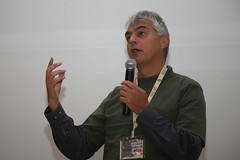By Arthur Chatora
Professor Guy Berger, the head of the School of Journalism and Media Studies at Rhodes University, presented a lecture entitled Cyber-activism and Legal Lessons at the Digital Citizen Indaba in Grahamstown on Sunday. The lecture interrogated the legal discrepancies within the blogosphere and focused on issues of censorship, credibility and regulation.
The example of the South African “male prostitute” who anonymously blogged and claimed “he” had sex with 50 so-called clients is an interesting case study of testing legal limits in the blogosphere. The controversy around the “male prostitute” raised questions such as whether the blogosphere should be regulated and where the line should be drawn between stories that infringe on privacy and stories that are in the public interest.
The debate still rages on, depending on one’s view. Independent Democrats leader Patricia de Lille called on the government to regulate the blogosphere. However, from a hard-line, pro-blogging perspective, regulating the blogosphere is a violation of bloggers’ right to freedom of expression. Other people argue that blogger regulation assumes people cannot make their own valid decisions. Citizens are adults capable of making individual choices and decisions. The accuracy and credibility of the anonymous blogger would thus be questioned considering “he” threatened to expose 50 so-called clients while “he” was blogging anonymously. Culturally conservative bloggers such as De Lille would be active advocates for regulation of scurrilous blogs within the blogosphere.
With legal discrepancies within the blogging environment, bloggers and potential bloggers need to know that the blogosphere is a wild frontier compared with old media.
The head of Zimbabwean cyber-activist website Kubatana, Brenda Burrell, delivered a presentation focused on the challenges of cyber-activism in oppressive environments. Kubatana was set up in 2001 in the wake of the exposure Zimbabwe following its 2000 presidential elections. Burrell explained that in a politically volatile environment like Zimbabwe, activists have to break laws to make a point. However, it is risky considering Kubatana rarely uses anonymity. Cyber-activism in Zimbabwe where the legal framework is government-oriented means that media workers need courage to motivate people.
It is through the use of effective communications tools such as blogs that ordinary Zimbabweans can be emancipated. The situation appears bleak considering there is no independent daily press and the government is continually enacting repressive laws to intercept communications. Kubatana is forced to employ not-so-polite tactics such as spamming, making its journalists cyber-dissidents. Burrell explained that the fight for free speech in Zimbabwe has been taken out of the country too much. Within the country, people excessively fear the government, resulting in self-censorship.
Burrell urged Africans to use ICT tools such as blogs to amplify their voices and fight. However, in hostile environments like Zimbabwe, bloggers alike need to balance the negatives and positives to foster hope. Although the struggle continues to be difficult because of a lack of resources and a hostile environment, people should understand that it is challenging to be an activist. It is much powerful for bloggers to retain their identities and not blog anonymously.
A blogger from Ethiopia, Habtamu Dugo, spoke about Ethiopian experiences and the challenges facing alternative voices in the Horn of Africa. Cyber-activism is new in Ethiopia and the country is lagging behind, considering the government “crushed blogs in the bud”.
In Ethiopia, blogs are written from three perspectives — from the diaspora, by sympathetic foreigners, and published within the country. Dugo explained that blogs are ethnic in nature, highlighting the colonial mentality within representations of dividing people to rule and maintain power over them.
As is the case with blogging in Zimbabwe, blogs and general websites in Ethiopia are highly censored and in some cases blocked. Some blogs published in the diaspora carry the banner “banned in Ethiopia”.
Free expression is heavily restricted and controlled. It is shocking that, in Ethiopia, citizens are required by law to leave their names at internet cafés they visit. Therefore, within Ethiopia, cyber-activism is non-existent as everything is blocked.
Chatora is a student in the New Media Lab at Rhodes University



